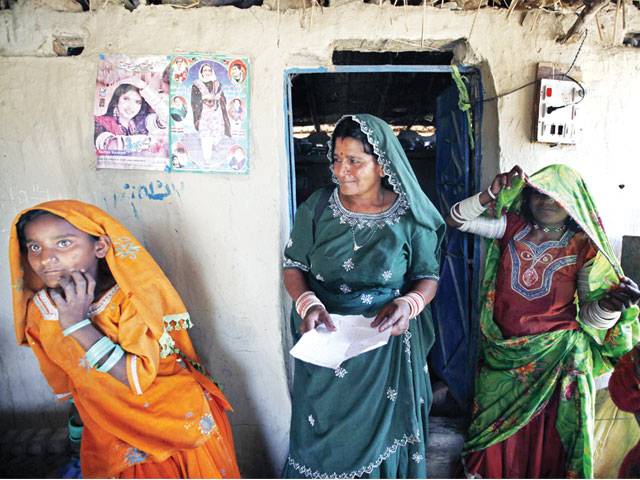HYDERABAD - When Veero Kolhi made the asset declaration required of candidates for May elections, she listed the following items: two beds, five mattresses, cooking pots and a bank account with life savings of 2,800 rupees ($28).
While she may lack the fortune that is the customary entry ticket to politics, Kolhi can make a claim that may resonate more powerfully with poor voters than the wearily familiar promises of her rivals.
For Kolhi embodies a new phenomenon on the campaign trail - she is the first contestant to have escaped the thrall of a feudal-style land owner who forced his workers to toil in conditions akin to modern-day slavery. "The landlords are sucking our blood," Kolhi told Reuters at her one-room home of mud and bamboo on the outskirts of Hyderabad. "Their managers behave like pimps - they take our daughters and give them to the landlords."
To her supporters, Kolhi's stand embodies a wider hope that the elections - country's first transition between elected civilian governments - will be a step towards a more progressive future for a country plagued by militancy and frequent political gridlock.
To sceptics, the fact that Kolhi has no realistic chance of victory is merely further evidence that even the landmark May 11 vote will offer only a mirage of change to a millions-strong but largely invisible rural underclass. Yet there is no doubt that hers is a remarkable journey. A sturdy matriarch in her mid-50s who has 20 grandchildren, Kolhi - a member of Hindu minority - is the ultimate outsider in an electoral landscape dominated by wealthy male candidates fluent in the art of back room deals.
Possessed of a ready, raucous laugh, but unable to write more than her name, Kolhi was once a "bonded labourer," the term used in Pakistan for an illegal but widely prevalent form of contemporary serfdom in which entire families toil for years to pay often spurious debts. Since making her escape in the mid-1990s, Kolhi has lobbied the police and courts to release thousands of others from the pool of indebted workers in her native Sindh province, the vast majority of whom are fellow Hindus. On April 5, Kolhi crossed a new threshold in her own odyssey when she stood on the steps of a colonial-era courthouse in Hyderabad and brandished a document officials had just issued, authorising her to run for the provincial assembly.
With no rival party to back her, Kolhi's independent run may make barely a dent at the ballot box in Sindh, a stronghold of President Asif Ali Zardari's ruling Pakistan People's Party (PPP).
But her beat-the-odds bravado has lit a flame for those who adore her the most: families she has helped liberate from lives as vassals.
"Once I only drank black tea, but now I am free I can afford tea with milk," said Thakaro Bheel, who escaped from his landlord a decade ago and now lives in Azad Nagar, a community of former bonded labourers on the edge of Hyderabad. "These days I make my own decisions. All that thanks to Veero."
Kolhi spends her days careering along dirt roads in a battered Suzuki minivan decorated with stickers of Ernesto "Che" Guevara, the Latin American revolutionary, on her quest for votes. Her only luxury: Gold Leaf, a brand of cigarette. Her only campaign equipment: an old megaphone.
While Kolhi clearly enjoys meeting supporters - greeting women by placing two palms on their bowed heads in a traditional gesture of protection - she has still only reached a fraction of her constituency's 133,000 voters. The favourite remains Sharjeel Memon, an influential businessman and PPP stalwart. Memon was not available for comment. Despite the struggle Kolhi faces, the fact she is able to run at all has emboldened campaigners for workers' rights in Sindh.
Even remote areas of the province have not been immune to the influence of a more assertive media and judiciary that have reshaped national politics during tumultuous years following a 1999 army coup and a transition to democracy in 2008.
Although Veero Kolhi works with a local organisation that says it has helped rescue some 26,000 indebted workers in the last 12 years, several estimates put the total figure of bonded labourers in Pakistan at roughly eight million. Not all landlords are tyrants, but the arrival last month of an extended family of 63 share-croppers at Azad Nagar, the village for freed workers, provided a glimpse of the timeoworn tricks they use to ensure debts keep on growing.
Kolhi's supporters say the only way to end the oppression in Sindh would be to give destitute workers their own plots of land. But as long as the feudal class retains political influence, talk of land reform remains taboo. Undaunted, Kolhi -- bedecked in a garland of red roses and jasmine -- launched her shot at office with an ultimatum.
"First we will ask the landlords to obey the law, and if they refuse we will take them to court," she said, her voice rising with emotion. "We will continue our struggle until the last bonded labourer is freed."
Friday, April 19, 2024
Bonded labourer Kolhi challenges landlords in polls

Decision to boost FED on cigarettes yields positive results
April 19, 2024
World poultry expo to be held at Gul Mukai Palace
April 19, 2024
KP govt decides to develop gemstone sector to boost exports
April 19, 2024
PTCL Group posts double digit revenue growth of 14pc
April 19, 2024
Hepatitis Challenge
April 18, 2024
IMF Predictions
April 18, 2024
Wheat War
April 18, 2024
Rail Revival
April 17, 2024
Addressing Climate Change
April 17, 2024
Justice denied
April 18, 2024
AI dilemmas unveiled
April 18, 2024
Tax tangle
April 18, 2024
Workforce inequality
April 17, 2024
New partnerships
April 17, 2024
ePaper - Nawaiwaqt
Advertisement
Nawaiwaqt Group | Copyright © 2024





